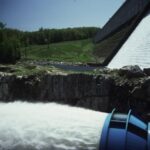Rutgers professor participating in historic ocean treaty negotiations predicts it will increase ocean resilience to climate change Climate change. Overfishing. Seabed floor mining. These are some of the epic challenges that would be addressed by a historic United Nations treaty protecting ocean biodiversity that gained backing in early March when a significant majority of nations […]
Human Ecology
Kendall Soto (SEBS’24), Creating a More Just Society
Kendall Soto (SEBS’24), EPIB major, is currently spending a semester abroad in Greece. Kendall recently joined 11 other study-abroad students as a Global Justice Fellow at a conference in London with President Holloway, international Rutgers Alumni, university administrators from RU-Global and ISGRJ-Newark, as well as local activists, to explore and converse about the possible ways […]
Rutgers Hosts 2023 World Food Prize New Jersey Youth Institute
High school students participate in global fight against hunger The New Jersey Youth Institute (NJYI), hosted by the School of Environmental and Biological Sciences (SEBS), is a transformative experience for high school students. Rutgers welcomed 177 students, 21 teachers/mentors, and 28 expert judges comprised of Rutgers staff, faculty and industry professionals to the Douglass […]
SEBS Professors Named Fellows of the American Association for the Advancement of Science
Three SEBS professors are among nine Rutgers faculty named to the 2023 cohort of 506 U.S. scientists, engineers and innovators recognized for their achievements Rutgers faculty elected to the newest class of fellows of the American Association for the Advancement of Science (AAAS) are engaging in research to enhance our understanding of the universe, prepare […]
Reflections on Superstorm Sandy, 10 Years Later
Combating climate change is one of our greatest challenges. Rutgers experts break down the policies, infrastructure changes, social justice reforms and other work that will be necessary to weather the storm. Robert Kopp Professor, Department of Earth and Planetary Sciences, Department of Marine and Coastal Sciences Co-Director, University Office of Climate Action PI, Rutgers Megalopolitan […]
Rutgers Ecologist Brooke Maslo Heads Bold Experiment in Building Climate-Resilient Coastal Communities
An effort led by Brooke Maslo aims to redevelop property purchased through New Jersey’s Blue Acres initiative to protect flood-prone parts of the state In the Watson-Crampton neighborhood of Woodbridge Township, New Jersey, meadows, marshlands and forests form a green, undeveloped crescent on the community’s eastern edge. At first glance, the acres of open space look like […]
Of Farms and Gardens: My Rutgers Gardens Internship
By Francis C. Blackman (SEBS’24) As an undergraduate student in the Environmental Policy Institutions and Behavior (EPIB) major program here at Rutgers, I had the opportunity to participate in the Rutgers Gardens Student Farm Internship this summer. When applying, it seemed like the Student Farm could offer a fulfilling setting to expand my knowledge of […]
Six SEBS Faculty Selected for 2022-23 Provost’s Teaching Fellows Program
Congratulations to the six faculty in the School of Environmental and Biological Sciences who are among the 2022-23 Cohort of Provost’s Teaching Fellows announced by the Office of the Chancellor-Provost. The program was initiated in 2021 to support pedagogical innovation aimed at improving student learning outcomes. It includes full cohort sessions to share goals and […]
SEBS Faculty Pamela McElwee and Malin Pinsky to Begin Earth Leadership Program Training
Pamela McElwee, professor, Department of Human Ecology, and Malin Pinsky, associate professor, Department of Ecology, Evolution, and Natural Resources, who were named Fellows of the Earth Leadership Program (ELP), will join their colleagues in the North American Cohort in an ELP training session in Racine, Wisconsin, from June 12-18. Elected in 2021, McElwee and Pinsky are […]
Prof. Dan Van Abs Awarded State Grant to Update NJ Water Supply Plan
Dan Van Abs, professor of professional practice in the Department of Human Ecology, has been awarded a grant of approximately $200,000 from the New Jersey Department of Environmental Protection (NJDEP) to help update the New Jersey Statewide Water Supply Plan. A former project manager for the 1996 Statewide Water Supply Plan during his previous tenure […]










